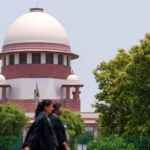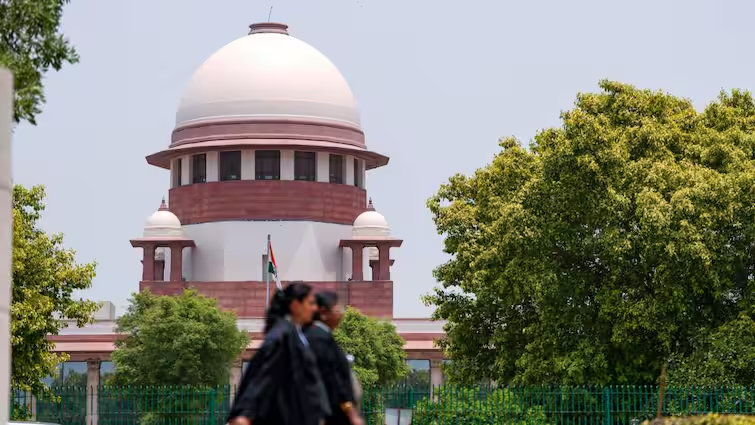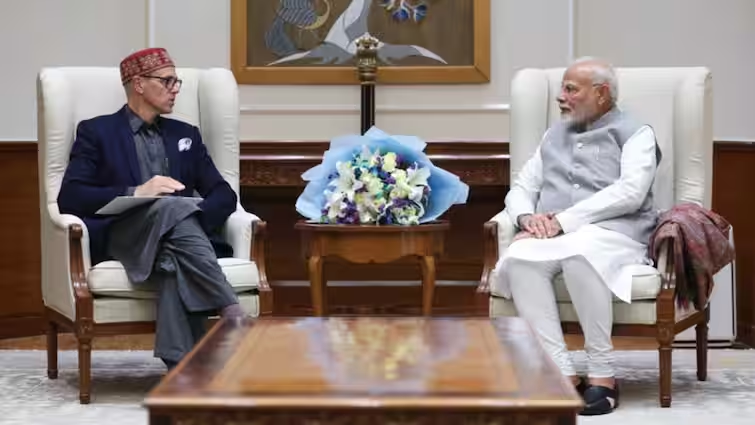Supreme Court Says Tamil Nadu Governor’s Withholding of Bills Was Illegal
Big Win for Stalin-Led DMK Government
New Delhi, Apr 8:
The Supreme Court of India has ruled that Tamil Nadu Governor RN Ravi acted against the law when he refused to give assent to 10 Bills passed by the Tamil Nadu State Assembly. The court said the Governor’s decision to withhold the Bills was illegal. It also declared that these Bills are considered approved (or “deemed passed”) from the date they were sent again to the Governor by the Assembly.
This decision is seen as a major victory for the DMK-led government in Tamil Nadu, headed by Chief Minister MK Stalin. The Tamil Nadu government had filed a petition in the Supreme Court, accusing the Governor of delaying important laws without giving any proper reason.
Court Criticizes Governor’s Actions
A bench of Justices JB Pardiwala and R Mahadevan gave the judgment on Tuesday. The court strongly criticized Governor RN Ravi for not taking action on the Bills passed by the elected Assembly. The judges said that the Governor’s delay was not acceptable in a democratic system.
The court said that once a Bill is passed by a state legislature and sent to the Governor, he must act within a reasonable time. If the Governor sends the Bill back and the legislature passes it again without any changes, then the Governor is expected to give his assent. In this case, if the Governor does not act, the Bill is considered approved by default.
This principle, called “deemed assent,” was applied by the court in this judgment. It means that even if the Governor does not sign the Bill, it becomes law if certain conditions are met.
Governor Cannot Send Bills to President After Refusing Assent
The Supreme Court also made an important clarification. It said that the Governor does not have the right to send a Bill to the President of India after refusing to give assent. According to the Constitution, the Governor can reserve a Bill for the President only before making a decision on assent. Once the Governor has refused to sign a Bill, he cannot later send it to the President.
This part of the ruling is very important because it sets a limit on the Governor’s powers. It stops Governors from delaying state laws by using the route of sending them to the President unnecessarily.
Background of the Case
The issue started when the Tamil Nadu government accused Governor RN Ravi of blocking several important Bills by not giving assent for a long time. The government said this was slowing down governance and stopping the functioning of the state.
The Bills that were delayed included laws related to the appointment of Vice Chancellors in state universities. This issue has been a point of tension between the Governor and the DMK government for some time. The government wants more control over these appointments, while the Governor has been resisting those changes.
The Tamil Nadu government approached the Supreme Court, saying that the Governor’s inaction was unconstitutional and harmful to the state’s democratic process. The state said that in a parliamentary system, the elected government should be allowed to function without obstruction.
Supreme Court Stresses Importance of Democracy
In its ruling, the Supreme Court said that India’s democracy is based on the will of the people, and the Governor should not go against that will. The Governor’s role is mostly ceremonial, and he should act as per the advice of the elected government, especially in day-to-day governance.
The court added that the Governor does not have the power to reject laws simply because he disagrees with them politically. His job is to make sure the laws passed by the state legislature are followed unless they are clearly against the Constitution.
What Happens Next?
With this ruling, the 10 Bills that were earlier stalled will now be treated as approved. This means the Tamil Nadu government can now move forward with implementing those laws.
Legal experts say this decision will also affect other states where there are tensions between Governors and elected governments. It sets a clear example that Governors must act quickly on Bills and cannot delay them for long without giving clear reasons.
The ruling also strengthens the role of elected state governments in India’s federal structure.
Reactions to the Ruling
Chief Minister MK Stalin welcomed the court’s decision and said it was a victory for democracy and constitutional values. He said that Governors should not be allowed to block the work of elected governments.
Several opposition leaders and legal experts also supported the ruling. They said it was a much-needed clarification from the Supreme Court about the role and limits of Governors in India.
However, some political commentators have said that this judgment may lead to more debates about the role of Governors in India’s federal system, especially when the central and state governments belong to different political parties.
The Supreme Court’s decision is a strong reminder that India’s democracy depends on the balance between different branches of government. It sends a message that Governors must respect the authority of elected state governments and cannot use their powers to delay laws without good reason.
As the Tamil Nadu government moves forward with its legislation, this ruling could lead to important changes in how state Governors function across the country. It may also push for future reforms to reduce conflicts between Governors and state governments.















